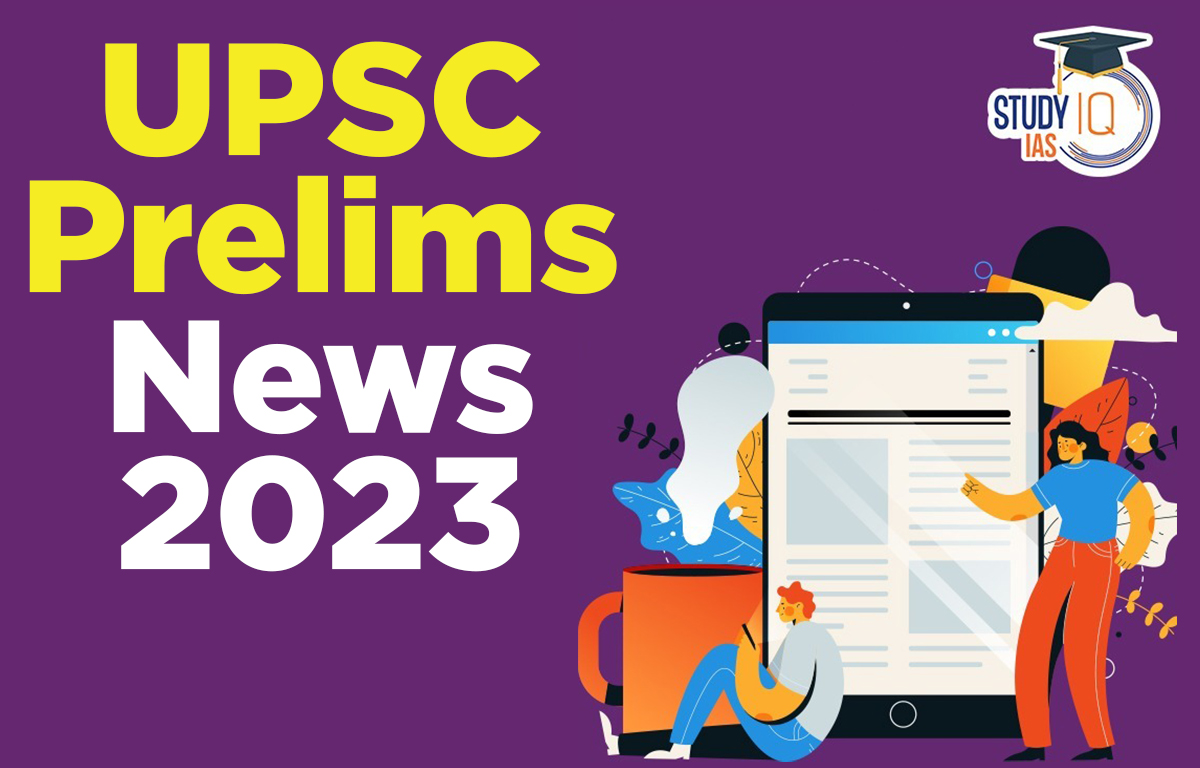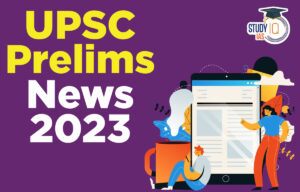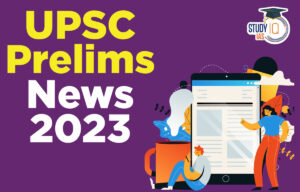UPSC Prelims News of 9 February 2023
Raja Ram Mohan Roy National Award
Context: Veteran journalist A.B.K. Prasad has been chosen for the prestigious Raja Ram Mohan Roy National Award for excellence in journalism.
About the Award
- It is an annual award given in India in recognition of contributions made by individuals and organizations in the field of social change and reform.
- It is named after Raja Ram Mohan Roy, an Indian social reformer who is considered to be the father of the Indian Renaissance.
- The award is given in various categories, including education, journalism, social work, and community service, and is usually presented by the President of India.
Important Facts on Raja Ram Mohan Roy (1772-1833)
- He was bestowed with the title of Raja by Akbar II, the Mughal emperor.
- Gopal Krishna Gokhale called him the ‘Father of Modern India’.
- Significant Contributions:
- He advocated for the elimination of practices such as sati (widow immolation) and child marriage.
- He founded the Atmiya Sabha in 1814, the Calcutta Unitarian Association in 1821, and the Brahmo Sabha in 1828 which later became the Brahmo Samaj.
- In 1825, he established a Vedanta college where courses in both Indian learning and Western social and physical sciences were offered.
- Important publications:
- He published his first book Tuhfat-ul-Muwahhidin (A Gift to Monotheism) in 1803.
- He wrote a book called “The Precepts of Jesus: The Guide to Peace and Happiness” in 1820.
- He translated the Vedas and the five Upanishads into Bengali to prove his conviction that ancient Hindu texts support monotheism.
- He started the first Bengali language weekly newspaper and the first newspaper in the Indian language, called Sambad Kaumudi, in 1821.
- He published an English weekly called the Bengal Gazette and a Persian newspaper called Miratul-Akbar.

UPSC Prelims News 8 February 2023
PM Poshan Scheme
Context: Ministry of Education asks CAG for a Special Audit of the implementation of the PM Poshan Scheme in the State of West Bengal.
About the PM POSHAN (Pradhan Mantri Poshan Shakti Nirman) Scheme
- In September 2021, the Union Cabinet approved PM-POSHAN for providing one hot cooked meal in Government and Government – aided Schools from 2021-22 to 2025-26.
- The scheme replaced the national programme for mid-day meals in schools or Mid-day Meal Scheme.
- Implementing agency: Ministry of Education.
- Main objectives:
- To address two of the pressing problems for majority of children in India, viz. hunger and education by improving the nutritional status of eligible children in Government and Government-aided schools.
- Encouraging poor children, belonging to disadvantaged sections, to attend school more regularly and help them concentrate on classroom activities.
- Beneficiaries: Under the Scheme, there is provision of hot cooked meal to children of pre-schools or Bal Vatika (before class I) in primary schools also in addition to the 11.80 crore children of classes I to VIII studying in 11.20 lakh schools.
- Eligibility: The Scheme is implemented across the country covering all the eligible children without any discrimination of gender and social class.
Avoid Confusion: POSHAN Abhiyaan (Prime Minister’s Overarching Scheme for Holistic Nutrition)
- It was launched in 2018 to address the problem of malnutrition in the country.
- The Abhiyaan aims to reduce malnutrition in the country in a phased manner, through a life cycle approach, by adopting a synergized and result oriented approach.
- Targets: To reduce stunting, underweight, anemia (especially among young children, women and adolescent girls) and reduce low birth weight by 2%, 2%, 3% and 2% per annum respectively.

Vivad Se Vishwas
Context: The Finance Ministry has proposed a voluntary settlement scheme with all government agencies.
About
- It has been named as Vivad se Vishwas II (Contractual Disputes) scheme and will bring finality to the contractual dispute settlement with government agencies, where an arbitral award is under legal challenge.
- It will be implemented through an online functionality on the Government e-Marketplace (GeM) portal.
- The settlement will be done by offering graded settlement terms depending on pendency level of the dispute.
- Applicability:
- The scheme will be applicable to Central government agencies, including autonomous bodies, public sector banks and financial institutions, central public sector firms, union territories and the National Capital Territory of Delhi and their agencies.
- However, organisations like metro corporations, where the Union government has a 50% stake, can choose to opt out of the scheme at their discretion after securing board approvals.
- The Scheme will only cover domestic arbitration and not international arbitration.
- CPSEs are also eligible to submit their claims under the scheme if they are the contractors/ suppliers in a particular contract.
- It will cover disputes up to 30 September 2022.
- Non-eligibility: Claims raised against procuring entities along with some other party like the State Government or private party will not be eligible under the scheme.
- Significance: The dispute resolution will ensure fresh investment and also enhance the ease of doing business with the Government.
Bio Fertilizers
Context: The Union government has informed the parliament that there are no proposals to make bio-fertilizers compulsory.
About
- Biofertilizers are supplements that contain microbes, which help in promoting the growth of plants by increasing the supply of essential nutrients to the plants.
- They are usually made up of living organisms such as mycorrhizal fungi, blue-green algae, and bacteria.
- Working: The micro-organisms present in biofertilizers restore the soil’s natural nutrient cycle and build soil organic matter, helping in the growth of plants
- Benefits
- Bio-fertilizers can improve crop yields by 10-25% and supplement chemical fertilizers by nearly 20-25% without any reduction in production.
- Biofertilizers promote healthy soil, leading to greater farming sustainability.
- It can reduce fertilizer subsidies drastically.
- Drawbacks: Biofertilizers show varying effects in different environments, making them rather unpredictable in terms of efficiency.

Mission Antyodaya Survey (MAS)
Context: The Union Minister for Rural Development and Panchayati Raj will inaugurate the Mission Antyodaya Survey (MAS) 2022-23.
About
- MAS is an annual survey conducted to collect village-level data by the Ministry of Rural Development and Panchayati Raj across Gram Panchayats in the country since 2017-18.
- It will be conducted over a period of one month involving Community Resource Persons (CRPs).
- Objective: The survey aims to support the process of participatory planning for the Gram Panchayat Development Plan (GPDP), improving service delivery, enhancing citizenship, creating a pace for an alliance of people’s institutions, and groups and improving governance at the local level.
- Significance: MAS presents secondary data to carry out a gap analysis in planning for Gram Panchayats and will also serve as a key input in the preparation of block and district plans.
- Questionnaire: The village-wise survey will have questions categorized into five stratums: (i) Panchayat Infrastructure; (ii) Panchayat Services; (iii) Village Infrastructure; (iv) Village Services; and (v) Village Practices.
- The questionnaire has been translated in 13 regional languages.
Delimitation
Context: Recently, a Member of Parliament has expressed that Delimitation on a population basis is unfair to southern states.
About Delimitation Exercise
- Delimitation: Delimitation is the act of redrawing boundaries of Lok Sabha and state Assembly seats to represent changes in population. The main objective of delimitation is to provide equal representation to equal segments of a population.
- Delimitation Commission: Delimitation is carried out by an independent Delimitation Commission, appointed by the Government of India under provisions of the Delimitation Commission Act.
- Appointment: The Delimitation Commission is appointed by the President of India and works in collaboration with the Election Commission of India.
- It is composed of the following: a retired Supreme Court judge, the Chief Election Commissioner of India and respective State Election Commissioners.
- The Constitution mandates that the Delimitation Commission’s orders are final and cannot be questioned before any court as it would hold up an election indefinitely.
- The Commission is supposed to determine the number and boundaries of constituencies in a way that the population of all seats, so far as practicable, is the same. The Commission is also tasked with identifying seats reserved for Scheduled Castes and Scheduled Tribes.
- Under Article 82, Parliament is to enact a Delimitation Act after every Census. Once the Act is in force, the Union government sets up the Delimitation Commission. Under Article 170, States also get divided into territorial constituencies as per Delimitation Act after every Census
- The Delimitation Commission Act was enacted in 1952. In the history of the Indian republic, Delimitation Commissions have been set up four times — 1952, 1963, 1973 and 2002 under the Acts of 1952, 1962, 1972 and 2002. There was no delimitation after the 1981, 1991 and 2001 Censuses
- The central government reconstituted the Delimitation Commission for Assam, Arunachal Pradesh, Nagaland, Manipur and the union territory of Jammu and Kashmir in 2020.
Bard vs ChatGPT
Context: Google has announced a new AI Chatbot called ‘Bard’.
About Bard and ChatGPT
- Google Bard is an AI-powered chatbot that can respond to various inquiries in a conversational manner.
- Bard is based on the Google’s Language Model for Dialogue Application or LaMDA.
- LaMDA, introduced in 2021 by Google, is a generative language model for dialogue applications. It enables Google Assistant to converse on any topic.
- Bard will use artificial intelligence to generate answers in text when people type in queries, like what ChatGPT does.
- ChatGPT is a large language model chatbot developed by startup called OpenAI. It has ability to interact in conversational dialogue form and provide responses that can appear human-like.
- ChatGPT is a large language model (LLM). Large Language Models (LLMs) are trained with massive amounts of data to accurately predict what word comes next in a sentence.
- Difference between Chat GPT and Bard: Chat GPT Cannot access real-time information from the Internet; while Bard draws on information from the web to provide fresh, high-quality responses.
- ChatGPT’s language model was trained on a vast dataset to generate text based on the input, and the dataset, at the moment, only includes information until 2021.
- But as per the demo shown by Google, it appears that for questions where there might not be a clear-cut answer, Bard will synthesise a response that reflects differing opinions.


 UPSC Prelims News 20 March 2023
UPSC Prelims News 20 March 2023
 UPSC Prelims News 17 March 2023
UPSC Prelims News 17 March 2023





















